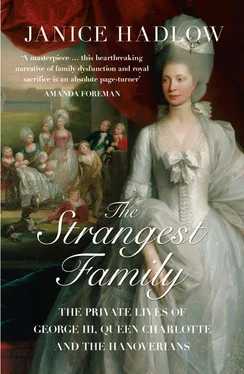When Horace Walpole wrote his highly partisan account of the early reign of George III, he maintained that there was far more to Bute’s appointment than anyone had realised at the time; it was, he claimed, the opening act in a plot aimed to do nothing less than suborn the whole constitution. In Walpole’s version of events, Augusta and Bute – ‘a passionate, domineering woman and a favourite without talents’ – conspired together to bring down the established political settlement. They intended first to indoctrinate the supine heir with absolutist principles, and then to marginalise him by ensuring his isolation from the world. All this was to be achieved in the most gradual and surreptitious manner. Ignorant and manipulated, George would remain as titular head of state; but behind him, real power would reside in the hands of Bute and Augusta. To add an extra frisson to a story already rich in classical parallels, Walpole insisted that Augusta and Bute were lovers, ‘his connection with the princess an object of scandal’. Elsewhere he was more blunt, declaring: ‘I am as much convinced of an amorous connexion between Bute and the princess dowager as if I had seen them together.’ 83
Related with all the passion he could muster, in Walpole’s hands this proved to be a remarkably potent narrative. For nearly two hundred years, until interrogated and revised by the work of twentieth-century historians, it was to influence thinking about George’s years as Prince of Wales and as a young king; and the reputations of Bute and Augusta are still coloured by Walpole’s bilious account of their alleged actions and motives. But in writing the Memoirs , Walpole’s purpose was scarcely that of a disinterested historian. First and foremost, he wrote to make a political point. Walpole was a Whig, passionately opposed to what he saw as the autocratic principles embraced by his Tory opponents, who, he had no doubt, desired nothing so much as to restore the pretensions and privileges of the deposed Stuarts. He was, he said, not quite a republican, but certainly favoured ‘a most limited monarchy’, and was perpetually on the lookout for evidence of plots hatched by the powerful and unscrupulous to undermine the hard-won liberties of free-born Britons. To that extent, the Memoirs , couched throughout in a tone of shrill outrage quite unlike Walpole’s accustomed smooth, ironic style, are best considered as a warning of what might happen rather than an account of what did – a chilling fable of political nightmare designed to appal loyal constitutionalists. Less portentously, Walpole also wrote to pay off a grudge. He considered he had been wronged by Bute, who had refused to grant him a sinecure Walpole believed he was owed: ‘I was I confess, much provoked by this … and took occasion of fomenting ill humour against the favourite.’ 84
Much of what resulted from this incendiary combination of intentions was simply nonsense, and often directly contradicted what Walpole had himself written in earlier days. In truth, there was no plot; Augusta was not ‘ardently fond of power’; neither she nor Bute was scheming to overturn the constitution; and it is extremely unlikely that they were lovers. But if the central proposition of Walpole’s argument was a fiction, that did not mean that everything he wrote was pure invention. The Memoirs exerted such a powerful appeal because Walpole drew on existing rumours that were very widely believed at the time; and because, sometimes, beneath Walpole’s wilder assertions there lay buried a tiny kernel of truth.
Thus, Walpole seemed on sure ground when describing the isolation in which George had been brought up, and the extraordinary precautions taken to keep him away from wider intercourse with the world. He was correct in his assertion that much of this policy had been driven by Augusta. He was wrong about her motives – the extreme retirement she imposed on her son was a protective cordon sanitaire, not a covert means of dominating him – but the prince’s isolation was observable to everyone in the political world, and of as much concern to Augusta’s few allies as it was to her enemies. Walpole was also right to assert that within the secluded walls of Kew and Leicester House, the future shape of George’s kingship was indeed the subject of intense discussion; but these reflections were directed towards an outcome very different from Walpole’s apocalyptic image of treasonous constitutional conspiracy. Finally, he was accurate in his suspicion that there was a passionate relationship at the heart of the prince’s household. But it was not, in fact, the one he went on to describe with such relish.
The stories about Bute and Augusta had been in circulation long before Walpole’s Memoirs appeared. Waldegrave, who never forgot or forgave the way he was humiliatingly ejected from his post around the prince, seems to have been the origin of many of them. ‘No one of the most inflammable vengeance, or the coolest resentment could harbour more bitter hatred than he did for the king’s mother and favourite,’ wrote Walpole with a hint of appalled admiration. 85For the rest of her life, as a result of these rumours, Augusta was mercilessly pilloried as a brazen adulteress; in newspapers, pamphlets, and above all in satirical caricatures, she was depicted as Bute’s mistress. One print showed her as a half-naked tightrope walker, skirt hitched up to her thighs, suggestively penetrated by a pole with a boot (a play on Bute’s name) attached to it. It was hardly surprising that Prince George was horrified ‘by the cruel manner’ in which his mother was treated, ‘which I will not forget or forgive till the day of my death’. 86
However, for all the salacious speculation surrounding their relationship, it seems hard to believe that Bute and Augusta ever had an affair. Although Augusta clearly admired the attractive earl, writing to him with an enthusiasm and warmth that few of her other letters betray, to embark on anything more than friendship would have been quite alien to her character. She was too cautious, too conscious of her standing in the world, too controlled and reserved to have taken the extraordinary risk such a relationship would have entailed. But, in the complex interplay of the political and the personal that transformed the tone of Augusta’s family in the latter years of the 1750s, there was one person who surrendered himself entirely to an unexpected and completely overpowering affection. The diffident young Prince George had finally found someone to love.
Bute had been acting as George’s informal tutor for less than a year before it was plain that he had achieved what no one had been able to do before: win the trust and affection of the withdrawn prince. Augusta was delighted. ‘I cannot express the joy I feel to see he has gained the confidence and friendship of my son,’ she wrote in the summer of 1756, with uncharacteristically transparent pleasure. 87The prince himself was equally fervent, writing almost ecstatically to Bute that ‘I know few things I ought to be more thankful to the Great Power above, than for having pleased Him to send you and help me in these difficult times.’ 88
This was the first of many letters the prince wrote to Bute over nearly a decade; its tone of incredulous gratitude, its sense of sheer good fortune at the very fact of Bute’s presence, was one that would be replicated constantly over the years. Their correspondence illuminates the painful intensity of George’s feelings for the earl, from his speedy capitulation to the onslaught of Bute’s persuasive charm, to the submissive devotion that characterised the prince’s later relationship with this charismatic, demanding and sometimes mercurial figure. George’s letters also offer a remarkably candid picture of his state of mind as a young man. He opened his heart to Bute in a way he had done to no one before, and would never do again after he and the earl had parted. Many of his letters make uncomfortable reading; they reveal an isolated and deeply unhappy character, consumed by a sense of his own inadequacies, and desperate to find someone who would lead him out of the fog of despair into which he was sinking. George knew he was drifting, fearful and rudderless, towards a future which approached with a horrible inevitability. He was very quickly convinced that Bute was the only person who could deliver him from the state of paralysed inertia in which he had existed since his father’s death. ‘I hope, my dear Lord,’ he wrote pleadingly, ‘you will conduct me through this difficult road and bring me to the goal. I will exactly follow your advice, without which I will inevitably sink.’ 89
Читать дальше












